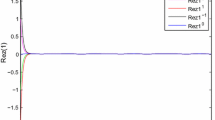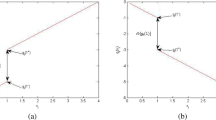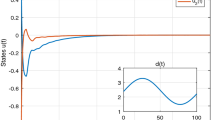Abstract
In this paper, we consider a general class of neural networks, which have arbitrary constant delays in the neuron interconnections, and neuron activations belonging to the set of discontinuous monotone increasing and (possibly) unbounded functions. Based on the topological degree theory and Lyapunov functional method, we provide some new sufficient conditions for the global exponential stability and global convergence in finite time of these delayed neural networks. Under these conditions the uniqueness of initial value problem (IVP) is proved. The exponential convergence rate can be quantitatively estimated on the basis of the parameters defining the neural network. These conditions are easily testable and independent of the delay. In the end some remarks and examples are discussed to compare the present results with the existing ones.
Similar content being viewed by others
References
Arik S (2002) An improved global stability result for delayed cellular neural networks. IEEE Trans Circuits Syst I 49: 1211–1214
Arik S (2002) An analysis of global asymptotic stability of delayed cellular neural networks. IEEE Trans Neural Netw 13(5): 1239–1242
Arik S, Tavsanoglu V (2000) On the global asymptotic stability of delayed cellular neural networks. IEEE Trans Circuits Syst I 47: 571–574
Aubin JP, Cellina A (1984) Differential inclusions. Springer-Verlag, Berlin
Bhat SP, Bernstein DS (2000) Finite-time stability of continuous autonomous systems. SIAM J Control Optim 38: 751–766
Boyd S, Ghaoui LE, Feron E, Balakrishnan V (1994) Linear matrix inequalities in system and control theory. SIAM, Philadelphia
Clarke FH (1983) Optimization and non-smooth analysis. Wiley, New York
Filippov AF (1964) Differential equations with discontinuous right-hand side. Transl Am Math Soc 42: 199–231
Forti M (2007) M-matrices and global convergence of discontinuous neural networks. Int J Circuit Theory Appl 35(2): 105–130
Forti M, Nistri P (2003) Global convergence of neural networks with discontinuous neuron activations. IEEE Trans Circuits Syst I 50: 1421–1435
Forti M, Tesi A (1995) New conditions for global stability of neural networks with application to linear and quadratic programming problems. IEEE Trans Circuits Syst I 42: 354–366
Forti M, Nistri P, Papini D (2005) Global exponential stability and global convergence in finite time of delayed neural networks with infinite gain. IEEE Trans Neural Netw 16(6): 1449–1463
Forti M, Grazzini M, Nistri P, Pancioni L (2006) Generalized Lyapunov approach for convergence of neural networks with discontinuous or non-Lipschitz activations. Physica D 214: 88–99
Gahinet P, Nemirovski A, Laub A, Chilali M (1995) LMI control toolbox for use with matlab. The MATH Works, Inc, Natick
Hale JK, Lunel SMV (1993) Introduction to functional differential equations, vol 99. Applied mathematical sciences. Springer-Verlag, Berlin
Hopfield JJ (1984) Neurons with graded response have collective computational properties like those of two-state neurons. Proc Nat Acad Sci USA 81: 3088–3092
Hu S, Wang J (2003) Absolute exponential stability of a class of continuous-time recurrent neural networks. IEEE Trans Neural Netw 14(1): 35–45
Kennedy MP, Chua LO (1988) Neural networks for nonlinear programming. IEEE Trans Circuits Syst I 35: 554–562
Liang X-B, Wang J (2001) An additive diagonal stability condition for absolute stability of a general class of neural networks. IEEE Trans Circuits Syst I 48(11): 1308–1317
Liao TL, Wang FC (2000) Global stability for cellular neural networks with time delay. IEEE Trans Neural Netw 11: 1481–1484
Lloyd NG (1978) Degree theory: Cambridge tracts in mathematics, vol 73. Cambridge University Press, Cambridge
Orlov Y (2005) Finite time stability and robust control synthesis of uncertain switched systems. SIAM J Control Optim 43: 1253–1271
Roska T, Boros T, Thiran P, Chua LO (1990) Detecting simple motion using cellular neural networks. In: Proceedings of the 1990 IEEE international workshop on cellular neural networks and their applications, pp 127–138
Wang JF, Huang LH, Guo ZY (2008) Dynamical behavior of delayed Hopfield neural networks with discontinuous activations. Appl Math Modell 33(11): 1793–1802
Xia YS, Feng G, Wang J (2004) A recurrent neural network with exponential convergence for solving convex quadratic program and related linear piecewise equations. Neural Netw 17: 1003–1015
Xue X, Bian W (2008) A project neural network for solving degenerate convex quadratic program. Neurocomputing 70: 2449–2459
Zak SH, Upatising V, Hui S (1995) Solving linear programming problems with neural networks: a comparative study. IEEE Trans Neural Netw 6: 94–104
Author information
Authors and Affiliations
Corresponding author
Rights and permissions
About this article
Cite this article
Qin, S., Xue, X. Global Exponential Stability and Global Convergence in Finite Time of Neural Networks with Discontinuous Activations. Neural Process Lett 29, 189–204 (2009). https://doi.org/10.1007/s11063-009-9103-7
Received:
Accepted:
Published:
Issue Date:
DOI: https://doi.org/10.1007/s11063-009-9103-7




